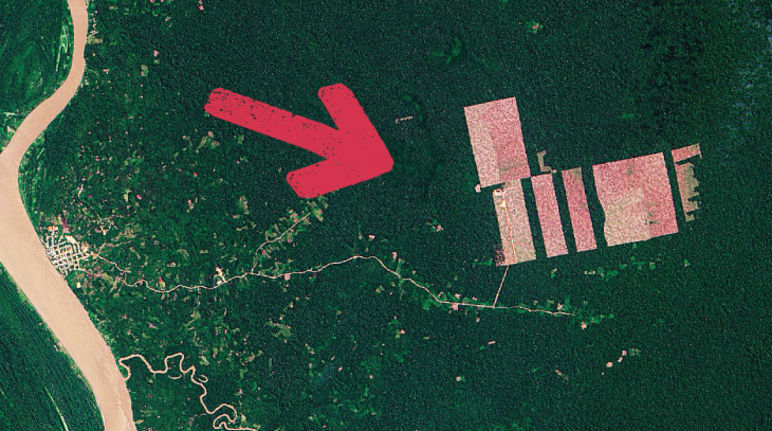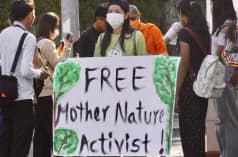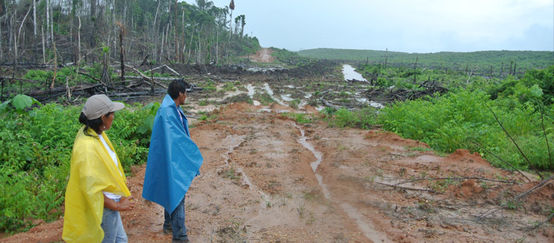Stop the chainsaws, Mr. "Climate President"!
 Palm oil companies in Peru are seeking permission to clear 100,000 hectares of rainforest. (photo: NASA) (© NASA)
Palm oil companies in Peru are seeking permission to clear 100,000 hectares of rainforest. (photo: NASA) (© NASA)
How can the environment minister of Peru preside over the UN Climate Summit in Lima while actively promoting rampant deforestation in his own country? Help us call him out on his hypocrisy! Please sign our petition and share it far and wide!
News and updates Call to actionTo: The President of the Republic of Peru, Mr. Ollanta Humala; the Minister of Environment, Mr. Manuel Pulgar-Vidal Otalóra
“Call on the government of Peru to stop the deforestation for oil palm plantations and protect the Amazon rainforest.”
The inhabitants of small towns on the banks of the Amazon live on what the rainforest has to offer by farming small plots and fishing in the river. Some also make crafts or serve as guides for tourists visiting the area from Iquitos, a town 50 kilometers to the north. They may not be getting rich, but their way of life helps to conserve the rainforest.
In recent months, however, life in Peru’s Amazonian lowlands has been marked by fear and turmoil. Corporations have begun with large-scale clear-cutting – initially in secret. The public did not become aware of the situation until September, when local papers broke the news of vast illegal clearings for oil palm plantations on their front pages.
It gradually came out that around a dozen companies had purchased 60,000 hectares of primary rainforest from the government in Loreto alone. They also requested logging concessions for more than 100,000 hectares in the Loreto and Ucayali regions.
Please sign our petition to the Peruvian government and responsible policymakers urging them to stop the clear-cutting immediately and prevent the planned oil palm plantations.
LetterTo: The President of the Republic of Peru, Mr. Ollanta Humala; the Minister of Environment, Mr. Manuel Pulgar-Vidal Otalóra
Dear Mr. President,
Dear Mr. Minister Pulgar-Vidal,
I would like to express my great dismay over deforestation in the Amazon rainforest of Loreto und Ucayali. Around 10,000 hectares of rainforest have already been cut down.
At least a dozen plantation companies in Loreto and Ucayali have applied for permission to clear 100,000 hectares of rainforest.
According to Forestry Law 27.308, protecting the forests is the responsibility of the government. We therefore call on you to:
– prevent the destruction of rainforests and defuse other ecological and social conflicts caused by the plantation companies by declining to authorize the clearing of 100,000 hectares of rainforest for plantations
– put an immediate end to the activities of plantation companies in Loreto and Ucayali
– investigate the circumstances under which the companies reportedly purchased up to 80,000 hectares of rainforest and prosecute those responsible for this irresponsible land trade.
The rainforests provide their inhabitants with a sustainable livelihood and are the habitat of a tremendous variety of wildlife and plants.
In light of the severe and irreversible damage that these activities entail, we call on you to act immediately and look forward to your positive response.
Sincerely,
The issue – rainforest on our dinner tables and in our fuel tanks
At 66 million tons annually, palm oil is the most commonly produced vegetable oil. Its low world market price and properties that lend themselves to processed foods have led the food industry to use it in half of all supermarket products. Palm oil can be found in frozen pizzas, biscuits and margarine, as well as body creams, soaps, makeup, candles and detergents.
Few people realize that almost half of the palm oil imported into the EU is used as biofuel. Since 2009, the mandatory blending of biofuels into motor vehicle fuels has been a major cause of deforestation.
Oil palm plantations currently cover more than 27 million hectares of the Earth’s surface. Forests and human settlements have been destroyed and replaced by “green deserts” containing virtually no biodiversity on an area the size of New Zealand.
The impact – suffering and death in producer countries, climate havoc
The warm, humid climate of the tropics offers perfect growth conditions for oil palms. Day after day, huge tracts of rainforest in Southeast Asia, Latin America and Africa are being bulldozed or torched to make room for more plantations, releasing vast amounts of carbon into the atmosphere. As a consequence, Indonesia – the world’s largest producer of palm oil – temporarily surpassed the United States in terms of greenhouse gas emissions in 2015. With their CO2 and methane emissions, palm oil-based biofuels actually have three times the climate impact of traditional fossil fuels.
Palm oil is not only bad for the climate: As their forest habitat is cleared, endangered species such as the orangutan, Borneo elephant and Sumatran tiger are being pushed closer to extinction. Smallholders and indigenous people who have inhabited and protected the forest for generations are often brutally driven from their land. In Indonesia, more than 700 land conflicts are related to the palm oil industry. Human rights violations are everyday occurrences, even on supposedly “sustainable” and “organic” plantations.
As consumers, we are largely unaware of these broader issues, yet our daily palm oil consumption also impacts our health: refined palm oil contains large amounts of harmful fatty acid esters that are known to damage DNA and cause cancer.
The solution – a revolution on our dinner tables and in our fuel tanks
Only 70,000 orangutans still roam the forests of Southeast Asia, yet the EU’s biofuels policy is pushing them to the brink of extinction. Every new plantation on Borneo is destroying a further piece of their habitat. Stepping up the pressure on policymakers is a must if we want to save our tree-dwelling kin. Apart from that, however, there is still a lot we can do in day-to-day life.
Follow these simple tips to recognize, avoid and combat palm oil:
- Enjoy a home-cooked meal: Use your imagination: why not try almond-coconut-pear biscuits? Or pizza with potato and rosemary? A meal cooked from fresh ingredients beats processed foods containing palm oil every time. Oils such as sunflower, olive, rapeseed or flaxseed are ideal for cooking and baking.
- Read labels: As of December 2014, labeling regulations in the EU require food products to clearly indicate that they contain palm oil. However, in the case of non-food items such as cosmetics and cleaning products, a wide range of chemical names may still be used to hide the use of palm oil. A quick check of your favorite search engine will turn up palm oil-free alternatives, however.
- Remember that the customer is king: Ask your retailers for palm oil-free products. Write product manufacturers and ask them why they aren’t using domestic oils. Companies can be quite sensitive to issues that give their products a bad name, so inquiring with sales staff and contacting manufacturers can make a real difference. Public pressure and increased awareness of the problem have already prompted some producers to stop using palm oil.
- Sign petitions and write your elected representatives: Online campaigns put pressure on policymakers responsible for biofuels and palm oil imports. Have you already signed all of Rainforest Rescue’s petitions?
- Speak out: Protest marches and creative action on the street raise public and media awareness of the issue, which in turn steps up the pressure on policymakers.
- Leave your car at home: Whenever you can, walk, ride a bicycle or use public transport.
- Be informed and inform others: Big Business and governments would like us to believe that biofuels are good for the climate and that oil palm plantations are sustainable. Spread the word – share this information with your family and friends and encourage them to rethink their consumption habits. It’s in our hands!














 Recent successes
Recent successes